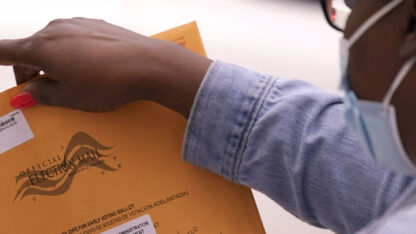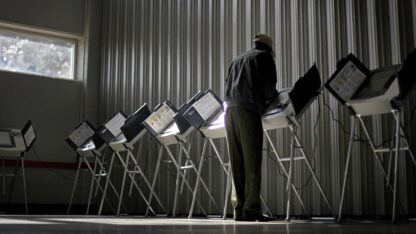The nation’s premier tool to protect voting rights is in mortal danger, threatened on multiple fronts by the Supreme Court and lower-ranking federal judges, scholars and civil rights advocates say.
The latest blow to the landmark Voting Rights Act of 1965 came this week in Arkansas, where a federal judge appointed by former President Donald Trump dismissed a case over new statehouse maps. The NAACP and the American Civil Liberties Union argued that the maps diluted the power of Black voters. But the judge said he found no way for the outside advocates to proceed.
“Only the Attorney General of the United States can bring a case like this one,” wrote Judge Lee Rudofsky.
The ACLU said the decision flouts decades of precedent and vowed to appeal.
“This ruling was so radical that there was no choice but to appeal it,” said Sophia Lin Lakin, deputy director of the ACLU’s Voting Rights Project. “Private individuals have brought cases under Section 2 of the Voting Rights Act to protect their right to vote for generations.”
The Arkansas ruling followed comments made by Supreme Court Justice Neil Gorsuch only seven months ago in an unrelated case over the scope of the Voting Rights Act, where he expressed doubts about private rights to sue.
“They are teeing up statutory and constitutional questions for the Court with the justifiable belief that the Court will welcome the narrow interpretation and the opportunity to further narrow the statute,” said Guy-Uriel Charles, an election law professor at Harvard Law School.
Conservative-majority Supreme Court dumped reviews of ballot changes, made it harder to sue for racial discrimination
The Arkansas case is the latest in a string of defeats for civil rights advocates, as conservative-leaning judges slowly dismantle key provisions of the law.
“The reality is that we’re in a period right now where things are in flux; there is a new majority on the Supreme Court and defendants are throwing things out there to see what sticks,” said Deuel Ross, senior counsel at the NAACP Legal Defense Fund, on a recent Election Law Blog podcast.
More than eight years ago, a closely divided Supreme Court gutted the most potent part of the voting rights law, known as Section 5, by taking away the Justice Department’s authority to pre-approve ballot changes in places with a history of discrimination. The ruling put government lawyers in a position of constantly playing catch-up to a series of changes, large and small, in mostly southern states.
Chief Justice John Roberts wrote that the law imposed “extraordinary measures” to fight racial discrimination. But, he said, circumstances changed in recent decades, citing rising voter turnout among Black voters.
“Our country has changed, and while any racial discrimination in voting is too much, Congress must ensure that the legislation it passes to remedy that problem speaks to current conditions,” Roberts wrote, pointing out the permanent ban on racial discrimination still exists in Section 2 of the law.
Then, in July 2021, the high court made it more difficult for people to sue under Section 2, which bars states from passing laws that result in “a denial or abridgement” on voters “on account of race or color,” by requiring plaintiffs to show they’d shouldered a significant burden or faced other hurdles.
Charles, of Harvard Law School, said that ruling is a clear signal of how the Supreme Court will review future voting rights challenges.
Next up: electoral maps that could put Black voters at a disadvantage
The court has already agreed to hear another case next term involving the scope of Section 2 and new maps in Alabama. As a preliminary matter, earlier this month, the justices paused a lower-court ruling that the maps put Black voters in Alabama at a disadvantage. Roberts and three liberal justices dissented.
“[I]t does a disservice to Black Alabamians who under that precedent have had their electoral power diminished—in violation of a law this Court once knew to buttress all of American democracy,” wrote dissenting Justice Elena Kagan.
Robert Driscoll, who served in the Justice Department’s Civil Rights division under former President George W. Bush, a Republican, said it’s far too soon to sound a death knell for the Voting Rights Act and that racially discriminatory voting practices, whether intentional or not, are still illegal.
The real risk is that the political parties will weaken confidence in elections generally, as they “energize their activist bases with hyperbolic references about the realities of voting,” Driscoll said.
“Voter turnout is as as high as it’s ever been in this country and it is easier to vote than ever, as Democratic activists complain about ‘voter suppression,’ ” he said. “At the same time, it is harder to cheat in an election than it ever has been and Republicans complain about voter fraud.”
Charles, of Harvard, however, said a chill wind is blowing from the federal courts.
“I would be very surprised if the Court does not interpret the statute in such a way as to take away the authority of states to draw majority-minority districts under the Act, except in cases in which the states have engaged in blatantly clear racial discrimination,” he said.
Copyright 2022 NPR. To see more, visit https://www.npr.org.
9(MDAxODM0MDY4MDEyMTY4NDA3MzI3YjkzMw004))

9(MDAxODM0MDY4MDEyMTY4NDA3MzI3YjkzMw004))








